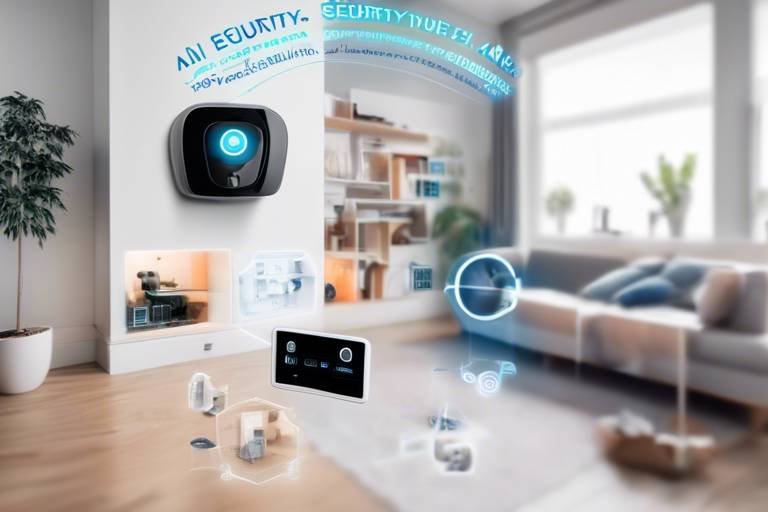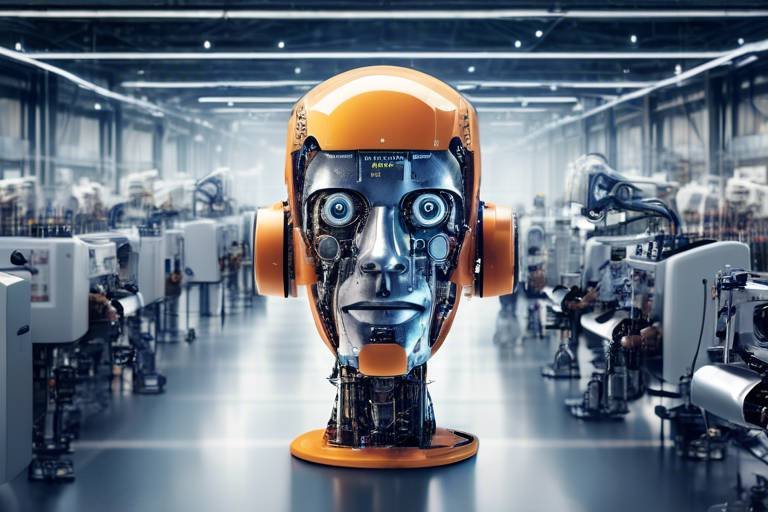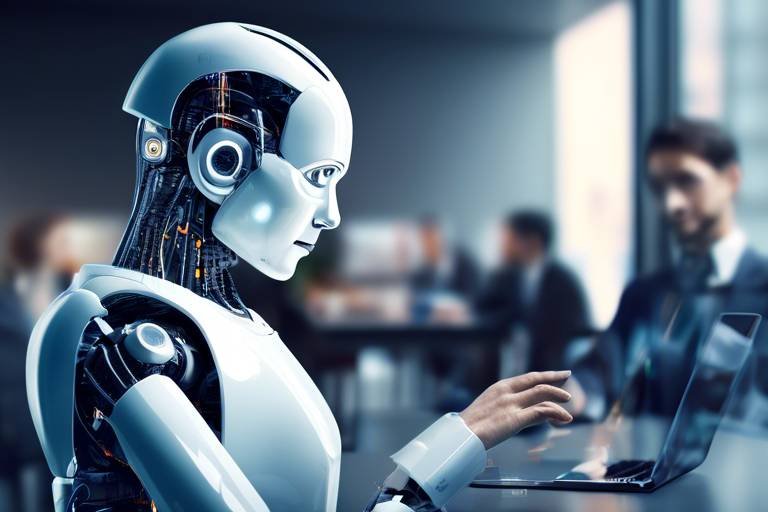How AI is Shaping the Future of Home Security
In today's fast-paced world, the notion of home security is evolving at an unprecedented rate, thanks to the advent of artificial intelligence (AI). Imagine a home that not only protects you but also learns your habits, understands your preferences, and adapts to your lifestyle. Sounds like something out of a sci-fi movie, right? Well, it’s becoming a reality. AI is revolutionizing the way we think about safety and security in our homes, making it more efficient, personalized, and responsive than ever before. From intelligent surveillance systems that can recognize faces to smart home devices that communicate seamlessly, the integration of AI is enhancing our ability to monitor and protect our spaces like never before.
One of the most significant advancements in home security is the development of AI-powered surveillance systems. These systems utilize sophisticated algorithms to enhance traditional surveillance methods. For instance, facial recognition technology allows cameras to identify known individuals while alerting homeowners to unfamiliar faces. This capability not only improves security but also reduces the number of false alarms that can arise from harmless activities, such as pets moving around or passing cars. Moreover, AI enhances motion detection by analyzing patterns and distinguishing between normal and suspicious activities. This means that homeowners can receive alerts for genuine threats, keeping them one step ahead of potential intruders.
Imagine being able to control your home's security features from your smartphone, no matter where you are. With AI, this is not just a dream but a reality. The integration of AI with smart home devices allows for seamless communication between various systems. For example, when your doorbell camera detects motion, it can automatically send a notification to your phone, allowing you to see who is at your door in real-time. This level of connectivity enhances overall safety and convenience, empowering homeowners to manage their security systems remotely. Additionally, the ability to automate responses—like locking doors or turning on lights—further enhances the protective measures in place.
AI systems are designed to analyze vast amounts of data quickly, which means they can send automated alerts to homeowners or authorities within seconds of detecting unusual activity. This feature is crucial for ensuring timely responses to security breaches. For instance, if a motion sensor picks up movement during unusual hours, the system can alert the homeowner and, if necessary, notify local law enforcement. This proactive approach to security can significantly reduce the risk of theft and vandalism, providing peace of mind to homeowners.
Every home is unique, and so are the security needs of each homeowner. AI enables the creation of personalized security protocols based on individual preferences and patterns. For example, a family with young children may prioritize monitoring their backyard, while a single professional might focus on the front entrance. By tailoring security measures to fit specific lifestyles, homeowners can enhance their protection in a way that feels natural and unobtrusive.
With AI, the concept of real-time monitoring takes on a whole new meaning. Homeowners can access live feeds from their security cameras, receive instant alerts, and even interact with visitors through two-way audio systems. This level of control allows for immediate action when necessary, whether it's scaring off an intruder or simply checking in on pets while away. The ability to monitor one's home in real-time creates a sense of security that was once only a luxury for the wealthy.
As we embrace the benefits of AI in home security, we must also address the data privacy and security concerns that come with it. AI systems collect and analyze vast amounts of data, which raises questions about how this information is stored and used. Homeowners need to be aware of the potential risks and ensure that their security systems have stringent safeguards in place. Regulations and best practices should be followed to protect personal data and maintain trust in these advanced technologies.
When it comes to home security, many homeowners are often concerned about costs. However, AI-driven security solutions can be more cost-effective in the long run. By reducing the need for extensive human monitoring and enabling proactive threat detection, these systems can save homeowners money on potential losses from theft or property damage. Additionally, many insurance companies offer discounts for homes equipped with advanced security systems, further offsetting the initial investment.
Investing in AI home security systems is not just about immediate safety; it’s about long-term savings as well. By minimizing the risk of theft and property damage, homeowners can enjoy lower insurance premiums and peace of mind. Over time, the initial costs of installing these systems are often outweighed by the financial benefits they provide.
Another significant advantage of AI security systems is their scalability. As technology evolves and homeowners' needs change, these systems can be easily expanded. Whether it’s adding new cameras, integrating additional smart devices, or upgrading software, AI solutions can grow with the homeowner. This flexibility ensures that security measures remain effective and relevant as circumstances change.
- What is AI home security? - AI home security refers to the use of artificial intelligence technologies to enhance the safety and monitoring of residential properties.
- How does AI improve surveillance systems? - AI enhances surveillance through features like facial recognition, motion detection, and real-time analytics, allowing for better monitoring and response to threats.
- Are AI security systems expensive? - While the initial investment may be higher, AI security systems can save money in the long run through reduced theft and lower insurance premiums.
- Can AI security systems be customized? - Yes, AI systems can be tailored to meet individual homeowner needs and preferences, providing personalized security solutions.

AI-Powered Surveillance Systems
Imagine a world where your home is not only a sanctuary but also a fortress, equipped with the latest technology to keep you safe. are revolutionizing the way we think about home security. These systems utilize advanced technologies like facial recognition, motion detection, and real-time analytics to monitor your property continuously. Gone are the days of traditional security cameras that merely record footage; today’s AI systems actively analyze that footage to identify potential threats and alert homeowners instantly.
At the heart of these innovations is facial recognition technology. This feature allows the system to differentiate between familiar faces and strangers. For instance, when a family member arrives home, the system recognizes them and can even unlock the door automatically. On the other hand, if an unfamiliar face is detected, the system can send an instant alert to your smartphone, giving you the power to respond to the situation immediately. It’s like having a digital watchdog that never sleeps!
Another critical aspect of AI surveillance is motion detection. Traditional motion sensors often trigger false alarms due to pets or passing cars. However, AI systems use advanced algorithms to differentiate between normal activity and potential threats. This means fewer false alarms and more reliable alerts. Imagine receiving a notification only when it truly matters, allowing you to focus on what’s important without unnecessary distractions.
Moreover, the analytics capabilities of AI-powered systems are nothing short of impressive. These systems can analyze patterns in activity around your home, learning what is normal for your environment. For example, if a person is detected lingering around your property at an unusual time, the system can flag this as suspicious behavior and alert you. This proactive approach to security means that you can take action before a potential break-in occurs.
In addition to these features, AI surveillance systems often come with cloud storage options, allowing you to access footage from anywhere at any time. Imagine being on vacation and receiving a notification about unusual activity at home. You can log into your system remotely, view live footage, and even communicate through two-way audio to deter any intruders. This level of control provides homeowners with peace of mind, knowing they can keep an eye on their property no matter where they are.
However, with all these advantages come some considerations. The implementation of AI-powered surveillance systems raises important questions about data privacy. As these systems collect vast amounts of data, homeowners must ensure that their information is stored securely and used responsibly. Manufacturers need to prioritize data protection to maintain user trust, and regulations may need to be established to safeguard personal information.
In summary, AI-powered surveillance systems are transforming home security into a more intelligent, responsive, and user-friendly experience. With features like facial recognition, advanced motion detection, and real-time analytics, homeowners can enjoy enhanced safety and peace of mind. As technology continues to evolve, we can expect even more innovative solutions that will redefine how we protect our homes.
- What is facial recognition technology in surveillance systems?
Facial recognition technology allows surveillance systems to identify and differentiate between familiar faces and strangers, enhancing security by providing instant alerts for unknown individuals. - How does motion detection work in AI systems?
AI-powered motion detection uses advanced algorithms to analyze movement patterns, reducing false alarms caused by pets or environmental factors. - Can I access my surveillance footage remotely?
Yes, most AI-powered surveillance systems offer cloud storage options that enable homeowners to view live footage and recorded videos from anywhere using their smartphones. - Are there privacy concerns with AI surveillance?
Yes, as these systems collect significant amounts of data, it is crucial to ensure that information is stored securely and used responsibly to protect user privacy.

Smart Home Integration
In today’s fast-paced world, the concept of a smart home is no longer just a futuristic dream; it’s a reality that many homeowners are embracing. The integration of artificial intelligence (AI) with smart home devices has created a seamless ecosystem that enhances security and convenience. Imagine walking into your home and having it recognize you, adjusting the lights, temperature, and even locking the doors behind you—all without lifting a finger. This is the power of AI-driven smart home integration.
With AI, smart home devices can communicate with one another, creating a cohesive network that responds to your needs. For instance, your security cameras can alert your smart doorbell when they detect motion, allowing you to see who is at your door in real-time from your smartphone. This level of integration not only enhances your home’s security but also provides you with peace of mind, knowing that you can monitor your home from anywhere.
Moreover, AI can learn your daily routines and adjust your security settings accordingly. For example, if you usually leave for work at 8 AM, your system can automatically lock the doors and activate the alarm as you walk out. This not only saves time but also reduces the chances of human error, such as forgetting to secure your home. The beauty of AI lies in its ability to adapt and evolve, ensuring that your home’s security measures are always in sync with your lifestyle.
Another exciting aspect of smart home integration is the ability to control your security features remotely. Whether you’re on vacation or just running errands, you can use your smartphone to check the status of your home security system. This includes viewing live feeds from your security cameras, receiving alerts about unusual activities, and even interacting with visitors through a smart doorbell. It’s like having a virtual security guard at your fingertips!
However, it’s essential to remember that with great power comes great responsibility. As we become more reliant on technology, the importance of data privacy and security cannot be overstated. AI systems collect a vast amount of data, and if not properly secured, this data can be vulnerable to breaches. Homeowners must ensure that their devices are updated regularly and that they are using strong passwords to protect their smart home systems.
In conclusion, the integration of AI with smart home technology is revolutionizing the way we think about home security. It offers unparalleled convenience, efficiency, and peace of mind. As these technologies continue to evolve, we can expect even more innovative solutions that cater to our unique needs, making our homes safer and smarter than ever before.
- What is smart home integration? Smart home integration refers to the ability of various smart devices in a home to communicate and work together seamlessly, often controlled through a central hub or smartphone app.
- How does AI enhance home security? AI enhances home security by providing advanced features such as facial recognition, real-time monitoring, and automated alerts, allowing homeowners to respond quickly to potential threats.
- Are AI-driven security systems expensive? While the initial investment may be higher, AI-driven security systems can save money in the long run by reducing the risk of theft and property damage.
- How can I ensure the privacy of my smart home devices? To ensure privacy, regularly update your devices, use strong and unique passwords, and be cautious about the information you share with smart home applications.

Automated Alerts and Notifications
Imagine this: You're lounging on your couch, binge-watching your favorite series, when suddenly your phone buzzes with an alert. It's not just any notification; it's a real-time update from your home security system, letting you know that there's been unusual movement detected in your backyard. This is the power of driven by artificial intelligence (AI). These systems have revolutionized how we perceive home security, transforming it from a passive setup into an active guardian of our homes.
AI-powered security systems utilize advanced algorithms to analyze data from various sensors and cameras around your property. When something out of the ordinary occurs—like a person lingering too long in your driveway or a door being left ajar—these systems spring into action. They can send immediate alerts not only to your smartphone but also to local authorities if necessary. This proactive approach ensures that you are always in the loop, even when you're miles away from home.
Furthermore, the notifications can be customized according to your preferences. For instance, you might want to receive alerts for specific areas of your home or during certain times of the day. This level of personalization means you can tailor your security measures to fit your lifestyle, making it more effective. Here are some examples of the types of alerts you might receive:
- Motion Detection Alerts: Notifies you when movement is detected in restricted areas.
- Door/Window Breach Alerts: Alerts you if a door or window is opened unexpectedly.
- Environmental Alerts: Sends notifications for smoke, carbon monoxide, or water leaks.
But it doesn't stop there! The integration of AI with these systems allows for a level of intelligence that goes beyond simple notifications. For example, if your system detects a potential break-in, it can automatically alert the police while simultaneously sending you a live video feed of the situation. This means you can assess the threat in real-time and provide crucial information to law enforcement, enhancing your home's security response.
Moreover, these automated alerts can also play a significant role in your daily life. Imagine receiving a notification that you left your garage door open or that your children have arrived home safely from school. The convenience of these alerts not only enhances security but also adds an extra layer of peace of mind to your everyday routine.
In conclusion, automated alerts and notifications powered by AI are not just a luxury; they are becoming a necessity in modern home security. They provide homeowners with the ability to stay informed and react promptly to any potential threats, making our homes safer than ever before. As technology continues to evolve, we can expect even more sophisticated systems that keep us connected and protected, no matter where we are.
Q: How do automated alerts work in AI security systems?
A: Automated alerts work by analyzing data from security cameras and sensors. When unusual activity is detected, the system sends notifications to your devices.
Q: Can I customize the types of alerts I receive?
A: Yes! Most AI security systems allow you to customize alerts based on your preferences, so you only receive notifications that matter to you.
Q: Are these alerts real-time?
A: Absolutely! AI systems provide real-time alerts, allowing you to respond quickly to any potential security threats.
Q: What happens if the system detects a break-in?
A: If a break-in is detected, the system can automatically alert local authorities and send you live video feeds of the incident.

Customized Security Protocols
In today's world, where every homeowner seeks to create a sanctuary of safety and comfort, have emerged as a game changer. Imagine your home security system not just being a one-size-fits-all solution but instead a tailored fortress that adapts to your unique lifestyle and preferences. This is precisely what AI technology offers—an intelligent approach to personalizing security measures.
With the ability to analyze your daily routines, AI can develop protocols that fit seamlessly into your life. For example, if you typically leave for work at the same time each day, AI can automatically arm your security system when you step out, ensuring your home is protected without you having to remember to do it yourself. Conversely, if you decide to work from home one day, the system can adjust its settings accordingly, perhaps by allowing you more flexibility with features like motion detection in certain areas of the house.
Moreover, customized security protocols can include a range of features tailored to your specific needs. Here are a few examples:
- Zone-Based Monitoring: You can set up different security levels for various zones in your home. For instance, the basement might have a higher alert level during the night compared to the living room.
- Remote Access: Homeowners can access and control their security settings remotely, adjusting protocols from wherever they are, whether at work or on vacation.
- Behavioral Analytics: AI can learn from your habits and alert you to any unusual activity. If your front door opens at a time when it usually remains closed, the system can send you an instant notification.
What’s truly fascinating is how these protocols evolve over time. As AI systems gather more data about your habits and preferences, they become increasingly adept at predicting your needs. This means that your home security can become more intuitive, adapting to changes in your lifestyle—whether that’s a new pet, a change in work hours, or even the addition of family members.
However, while the benefits of customized security protocols are clear, it’s essential to consider the implications of such personalization. The more tailored the system becomes, the more data it collects. This brings us to the critical conversation about privacy and data security. Homeowners must ensure that their systems are equipped with robust security measures to protect their personal information from potential breaches.
In conclusion, customized security protocols represent a significant leap forward in home security technology. By harnessing the power of AI, homeowners can enjoy a level of protection that is not only effective but also tailored to their unique lifestyles. As we continue to embrace innovation in our homes, the future of security looks brighter and more personalized than ever.
- What are customized security protocols? Customized security protocols are tailored security measures developed by AI systems based on individual homeowner preferences and daily routines.
- How does AI learn my habits? AI systems analyze data collected from your daily activities, allowing them to adapt and create personalized security settings that fit your lifestyle.
- Are there privacy concerns with AI security systems? Yes, as these systems collect data, it's crucial to ensure that robust security measures are in place to protect personal information.
- Can I change my security settings remotely? Absolutely! Most AI-driven home security systems allow homeowners to adjust their settings from anywhere using a smartphone or computer.

Real-Time Monitoring
Imagine you're sipping your morning coffee, and instead of worrying about whether you locked the front door or if someone is lurking around your property, you can simply glance at your smartphone. powered by AI technology transforms this scenario from a source of anxiety into a moment of peace. With sophisticated algorithms and smart sensors, AI-enabled security systems continuously analyze live feeds from your cameras, providing you with instant updates and alerts about any unusual activity.
These systems utilize advanced motion detection and facial recognition technologies to distinguish between normal and suspicious behavior. For instance, if a package is delivered, the system recognizes it as a routine event and sends you a friendly notification. However, if an unknown individual approaches your home, the system instantly alerts you, allowing you to respond proactively. This level of vigilance means that you can monitor your home from anywhere in the world, whether you're at work, on vacation, or simply out for a jog.
Moreover, real-time monitoring isn't just about alerting homeowners; it also enhances communication with law enforcement and emergency services. In the event of a potential breach, AI systems can automatically contact authorities, providing them with live video feeds and crucial information about the situation. This rapid response can significantly reduce the time it takes for help to arrive, potentially preventing loss or damage to property.
To illustrate the effectiveness of real-time monitoring, consider the following table that compares traditional security systems with AI-powered solutions:
| Feature | Traditional Security Systems | AI-Powered Security Systems |
|---|---|---|
| Response Time | Delayed notifications | Instant alerts and automated responses |
| Monitoring Capability | Limited to scheduled checks | 24/7 real-time monitoring |
| Data Analysis | Basic recording | Advanced analytics for threat detection |
| User Control | Manual intervention required | Remote access and control via smartphone |
This comparison highlights the undeniable advantages of integrating AI into home security systems. The ability to monitor your home in real-time not only enhances your peace of mind but also empowers you to take control of your safety. Imagine being able to check on your home while you’re away, ensuring that everything is as it should be, or being alerted instantly if something seems off. This level of connectivity and responsiveness is what makes AI-driven real-time monitoring a game-changer in the realm of home security.
- How does real-time monitoring work? Real-time monitoring uses AI algorithms to analyze data from security cameras and sensors, providing immediate alerts and updates to homeowners.
- Can I access my security system remotely? Yes, most AI-powered security systems allow you to monitor your home through a smartphone app, enabling you to check in from anywhere.
- What happens if the system detects unusual activity? The system will send you an alert and can automatically contact local authorities if necessary.
- Is my data secure with AI monitoring systems? While AI systems collect data, reputable providers implement stringent security measures to protect your information.

Data Privacy and Security Concerns
As we embrace the incredible advancements brought by artificial intelligence in home security, it's crucial to address the elephant in the room: . With AI systems constantly collecting and analyzing vast amounts of data—from your daily routines to the comings and goings of your family members—how can we ensure that this information is protected?
Imagine a world where your home security system knows your habits so well that it can predict when you’re home or away. Sounds convenient, right? But what happens if that data falls into the wrong hands? The potential for misuse is alarming. Cybercriminals could exploit vulnerabilities in the system, leading to unauthorized access not just to your security cameras, but potentially to your entire home network.
Moreover, the integration of AI with smart home devices raises questions about who has access to your data. Is it just the homeowner, or do third-party companies also gain access? Many AI security systems require users to agree to extensive terms and conditions, often buried in legal jargon. This lack of transparency can leave homeowners unaware of how their data is being used or shared.
To tackle these concerns, here are some key points to consider:
- Data Encryption: Ensure that any AI security system you choose uses robust encryption methods. This helps protect your data from unauthorized access.
- User Control: Look for systems that allow you to control who has access to your data. You should be able to revoke permissions easily.
- Regular Updates: Choose security systems that receive regular updates and patches to address potential vulnerabilities.
Legislation is also evolving to protect consumer data. Laws such as the General Data Protection Regulation (GDPR) in Europe and various state-level regulations in the U.S. aim to provide more rights to consumers regarding their data. However, enforcement and compliance can vary widely, leaving many homeowners vulnerable.
In conclusion, while AI-driven home security solutions offer unprecedented convenience and safety, they also bring significant privacy and security challenges that homeowners must navigate. By staying informed and proactive, you can enjoy the benefits of these technologies while minimizing risks. The key is to strike a balance between utilizing advanced security features and safeguarding your personal information.
- What should I look for in an AI home security system? Look for features like data encryption, user control options, and regular software updates.
- How can I protect my data? Use strong, unique passwords, enable two-factor authentication, and regularly review your privacy settings.
- Are there regulations protecting my data? Yes, laws like GDPR and CCPA provide certain rights regarding your personal data, but enforcement varies.

Cost-Effectiveness of AI Security Solutions
When it comes to home security, the initial investment can often feel daunting. However, AI-driven security solutions are proving to be a game-changer in terms of cost-effectiveness. Imagine a world where your home is monitored 24/7, yet you’re spending less than you would on traditional security measures. Sounds too good to be true? Let’s dive into how AI is reshaping the financial landscape of home security.
First off, let’s talk about the reduction in human monitoring costs. Traditional security systems often require a dedicated team of security personnel to monitor feeds, respond to alarms, and patrol properties. This can lead to significant ongoing expenses. In contrast, AI systems utilize advanced algorithms to automate these processes, drastically reducing the need for human intervention. By integrating AI, homeowners can enjoy peace of mind without the hefty price tag associated with human monitoring.
Moreover, AI security solutions are designed to be proactive rather than reactive. This means they can detect threats before they escalate into serious incidents. For example, AI systems can analyze patterns in data to identify unusual behavior, such as a person loitering near your home at odd hours. By alerting homeowners or authorities in real-time, these systems can help prevent theft or vandalism, ultimately saving you from costly damages. Think of it as having a virtual security guard who never sleeps!
In addition to immediate savings, investing in AI home security systems can lead to long-term financial benefits. Consider the following:
- Minimized Theft: Homes equipped with AI security are less likely to be targeted by criminals, leading to fewer losses.
- Reduced Property Damage: Quick alerts can prevent situations from escalating, saving you from expensive repairs.
- Lower Insurance Premiums: Many insurance companies offer discounts for homes with advanced security systems, further decreasing your overall costs.
Another fascinating aspect of AI security solutions is their scalability. As your needs evolve, you can easily expand your AI security measures without the hassle of overhauling your entire system. For instance, if you add a new room or convert a basement into a living space, you can simply integrate additional cameras or sensors into your existing setup. This flexibility not only saves money but also ensures that your security measures are always up-to-date with the latest technology.
To sum it up, while the initial cost of AI security systems might be higher than traditional options, the long-term savings and efficiency they provide make them a wise investment. With reduced monitoring costs, proactive threat detection, and the ability to scale as needed, homeowners can enjoy enhanced security without breaking the bank. It’s a win-win situation, ensuring that your home remains a safe haven without draining your finances.
- Are AI security systems more expensive than traditional systems? While the upfront cost may be higher, the long-term savings often make AI systems more cost-effective.
- Can I integrate AI security with my existing home automation system? Yes! Many AI security solutions are designed to work seamlessly with existing smart home devices.
- What happens if the AI system misidentifies a threat? Most AI systems have multiple verification methods and will alert homeowners to confirm before taking action.

Long-Term Investment Benefits
When it comes to home security, investing in AI-driven systems is not just about immediate protection; it's also about making a smart financial decision for the future. Picture this: you install a cutting-edge AI security system today, and over the years, it starts to pay for itself in ways you might not have initially considered. of AI home security systems extend beyond just keeping your property safe; they can lead to significant savings and peace of mind.
One of the most compelling advantages of AI security systems is their ability to minimize theft and property damage. Traditional security measures often rely on reactive responses—waiting for an event to occur before taking action. In contrast, AI systems proactively monitor your home, using advanced algorithms to detect unusual behavior and alert you before a situation escalates. This proactive approach can drastically reduce the likelihood of a break-in, ultimately saving you from the emotional and financial toll of theft.
Moreover, consider the impact on your homeowner's insurance. Many insurance companies offer discounts for homes equipped with advanced security systems. By investing in AI technology, you could see a reduction in your insurance premiums, leading to substantial annual savings. For example, if your insurance premium is $1,200 per year, a 10% discount for having an AI security system could save you $120 annually. Over a decade, that's a whopping $1,200 back in your pocket!
Another point worth mentioning is the scalability of AI solutions. As your life evolves—whether you expand your family, acquire more valuables, or even move to a larger home—your security needs will change. AI systems are designed to grow with you. You can easily add new devices or features without the need for a complete overhaul, making it a cost-effective solution in the long run.
In addition to these financial benefits, the integration of AI into your home security also means you are investing in a technology that is continually improving. AI systems learn from their environment and can adapt to new threats as they arise. This means that your security solution is not static; it evolves, providing ongoing protection without the need for constant upgrades or replacements.
To summarize, the long-term investment benefits of AI home security systems can be broken down into a few key points:
- Reduction in theft and property damage: Proactive monitoring can prevent incidents before they occur.
- Insurance savings: Many insurers offer discounts for homes with advanced security systems.
- Scalability: Easily expand your system as your needs change.
- Ongoing improvements: AI systems adapt and learn over time, ensuring you stay protected against new threats.
In conclusion, investing in AI-driven home security is not just about keeping your home safe; it's about making a smart financial choice that pays dividends in the form of savings, peace of mind, and adaptability. So, why wait? Start securing your future today!
Q: How does an AI security system work?
A: AI security systems use advanced algorithms to analyze data from cameras and sensors, detecting unusual patterns or behaviors in real-time to alert homeowners or authorities.
Q: Are AI security systems expensive?
A: While the initial investment can be higher than traditional systems, the long-term savings from reduced theft and lower insurance premiums can make them more cost-effective.
Q: Can I integrate AI security with my existing smart home devices?
A: Yes! Many AI security systems are designed to seamlessly integrate with existing smart home technology, enhancing overall security and convenience.
Q: What happens if the AI system fails?
A: Most AI security systems have backup protocols in place, including alerts sent directly to homeowners or authorities, ensuring that security is maintained even in the event of a failure.

Scalability of AI Solutions
When it comes to home security, scalability is a game-changer. Imagine starting with a basic security system that grows and evolves as your needs change. This is precisely what AI solutions offer homeowners today. With the rapid advancements in technology, AI-driven security systems are designed to be flexible and adaptable, allowing for easy upgrades and expansions. Whether you’re a new homeowner looking to install your first security system or someone with an established setup wanting to enhance your defenses, AI scalability ensures that your system can grow with you.
One of the most significant advantages of scalable AI solutions is that they can be tailored to fit any size of home or budget. For instance, if you start with just a few cameras and sensors, you can effortlessly add more as your home expands or as your security needs become more complex. This is particularly beneficial for growing families or those who may be moving into larger properties in the future. Instead of investing in an entirely new system, you can simply integrate additional components into your existing setup.
Furthermore, the scalability of AI solutions means you can incorporate the latest technologies without a complete overhaul. For example, as new features emerge—like improved facial recognition or advanced motion detection capabilities—you can upgrade your current system to include these enhancements. This not only keeps your home secure but also ensures that you are utilizing the most cutting-edge technology available.
To illustrate the scalability of AI solutions, consider the following table that highlights the different components that can be easily added to an existing security system:
| Component | Description | Benefits |
|---|---|---|
| Additional Cameras | Install more cameras for complete coverage. | Enhanced visibility and monitoring. |
| Smart Locks | Integrate smart locks for keyless entry. | Increased convenience and security. |
| Motion Sensors | Add sensors to detect movement in specific areas. | Real-time alerts and monitoring. |
| AI Analytics | Utilize AI for advanced data analysis. | Proactive threat detection and response. |
Moreover, the scalability of AI solutions also allows for integration with other smart home devices. This means that your security system can work in harmony with your smart thermostat, lighting, and even your home assistant. Imagine receiving an alert on your phone when a security breach is detected, and your home automatically locks the doors and turns on the lights to deter intruders. This level of integration not only enhances security but also provides a seamless living experience.
In conclusion, the scalability of AI solutions in home security represents a significant leap forward in protecting our homes. It offers homeowners the flexibility to adapt to their changing needs while ensuring they remain at the forefront of technology. With AI-driven systems, the future of home security is not just about keeping intruders out; it’s about creating a safe, responsive, and intelligent home environment.
- What is the main benefit of scalable AI security solutions?
Scalable AI security solutions allow homeowners to easily expand and upgrade their security systems as their needs change, ensuring ongoing protection without the need for a complete system replacement. - Can I integrate my AI security system with other smart home devices?
Yes, many AI security systems are designed to work seamlessly with other smart home devices, providing enhanced security and convenience. - Are AI security systems cost-effective?
While the initial investment may be higher, AI security systems can save money in the long run by reducing the need for extensive human monitoring and minimizing potential losses from theft or damage.
Frequently Asked Questions
- How does AI improve home security systems?
AI enhances home security systems through advanced technologies like facial recognition, motion detection, and real-time analytics. This means your security cameras can not only record but also analyze the footage to identify potential threats, making it easier to respond quickly.
- Can AI security systems integrate with my smart home devices?
Absolutely! AI security systems are designed to seamlessly integrate with various smart home devices. This allows you to control your security features remotely, such as locking doors or viewing camera feeds, all from your smartphone.
- What are automated alerts and notifications?
Automated alerts are notifications sent by AI systems when they detect unusual activities or security breaches. For instance, if someone approaches your home unexpectedly, the system can notify you instantly, enabling you to take action without delay.
- How can I customize my AI security protocols?
AI security systems allow for personalized settings based on your lifestyle and preferences. You can set specific alerts, adjust sensitivity levels for motion detection, and even create schedules for when certain features are active, ensuring your home is protected exactly how you want it.
- Are there privacy concerns with AI security systems?
Yes, while AI systems offer enhanced security, they also raise valid privacy concerns. These systems collect vast amounts of data, so it's crucial to ensure they have strong data protection measures in place and comply with relevant regulations to safeguard your information.
- Is investing in AI security systems cost-effective?
Definitely! Although the initial investment might seem high, AI-driven security solutions can save you money in the long run. They reduce the need for constant human monitoring and help prevent losses from theft or property damage, ultimately lowering your insurance costs.
- Can I expand my AI security system as my needs change?
Yes, one of the best features of AI security systems is their scalability. Whether you're adding new devices or upgrading existing ones, these systems can easily adapt to meet your evolving security needs without requiring a complete overhaul.



















